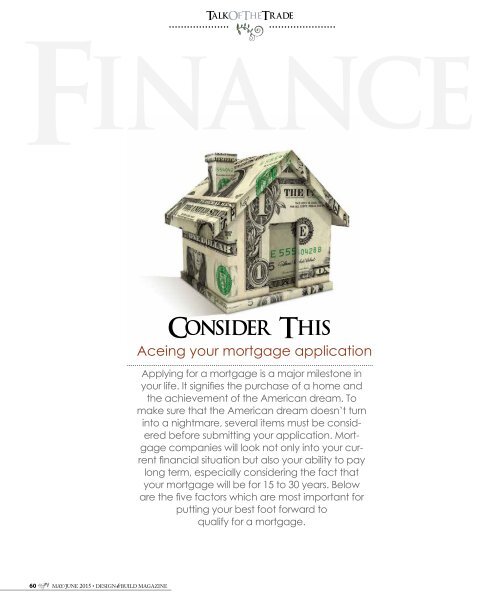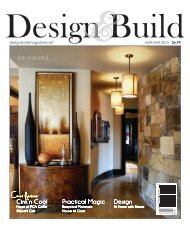You also want an ePaper? Increase the reach of your titles
YUMPU automatically turns print PDFs into web optimized ePapers that Google loves.
TalkOfTheTrade<br />
Finance<br />
Consider This<br />
Aceing your mortgage application<br />
Applying for a mortgage is a major milestone in<br />
your life. It signifies the purchase of a home and<br />
the achievement of the American dream. To<br />
make sure that the American dream doesn’t turn<br />
into a nightmare, several items must be considered<br />
before submitting your application. Mortgage<br />
companies will look not only into your current<br />
financial situation but also your ability to pay<br />
long term, especially considering the fact that<br />
your mortgage will be for 15 to 30 years. Below<br />
are the five factors which are most important for<br />
putting your best foot forward to<br />
qualify for a mortgage.<br />
FIRST YOU WANT TO CONSIDER IF YOU CAN AFFORD<br />
the mortgage for which you are applying. Generally<br />
speaking you should not purchase a home which is more<br />
than 3 times your annual salary. In the same vein you<br />
should not obtain a mortgage which accounts for more<br />
than one-third of your income. Assuming there is no major<br />
change in your income during the term of your mortgage<br />
this should ensure its ongoing affordability for you<br />
and your family.<br />
The second item to consider is the amount of the down<br />
payment. A target goal should be 20% of the purchase<br />
price for your new home. If you are unable to make a<br />
down payment of 20% you typically will have to purchase<br />
insurance which protects the mortgage company<br />
from default. This insurance is called private mortgage<br />
insurance and will remain a portion of your monthly payment<br />
until you reach at least an 80:20 ratio in debt to<br />
value. If you are unable to make a 20% down payment,<br />
one potential workaround to avoid private mortgage insurance<br />
would be to finance 80% of your loan through a<br />
first mortgage and the remaining amount through a second<br />
mortgage. You will need to discuss this with your<br />
mortgage broker to determine if it is an option for you.<br />
Applying for a mortgage will require a strong credit<br />
score. In order to build your credit score consider obtaining<br />
a credit card and using it for everyday purchases. At<br />
the end of each month pay off the entire balance. After<br />
doing so for 12 consecutive months you will see an increase<br />
in your credit score. You can also build credit by<br />
making on time car payments. If you initially do not qualify<br />
for a mortgage, try purchasing a home through your<br />
local bank and making on time payments for a period of<br />
12 months. <strong>Build</strong>ing your credit demonstrates to your<br />
mortgage company that you are a good risk and your<br />
chances of approval improve exponentially. Your credit<br />
score will likely be the determining factor as to whether<br />
you receive mortgage approval.<br />
In order to demonstrate to the mortgage company that<br />
you are a good candidate, you need to have been employed<br />
for a period in excess of one year. Job stability<br />
shows a funding stream that will be used to pay back the<br />
mortgage. Your mortgage broker will require copies of<br />
two or more years of tax returns, as well as W-2 and pay<br />
stubs showing continued employment. It is also typical<br />
for a mortgage company to contact your employer to<br />
verify employment during the loan process and sometimes<br />
on the day of closing. You will also be asked to<br />
sign documentation which states that your employment<br />
is unchanged and that your income is the same as what is<br />
reflected on your loan application.<br />
The final thing to consider before applying for a mortgage<br />
is that you have not requested credit for any other<br />
large purchase at the time of your mortgage application<br />
or while your mortgage application is pending before<br />
closing. During the underwriting process the mortgage<br />
company will review your income and credit history to<br />
make a determination as to whether they believe you<br />
can meet the terms of the mortgage. If you have recently<br />
made a new debt obligation, it will be hard to determine<br />
whether you can effectively service that debt in addition<br />
to your new mortgage. Once you are approved and preparing<br />
to close, if you were to purchase a car or boat,<br />
the credit used could be detrimental to your mortgage<br />
approval. If new credit is applied for and received during<br />
this period, oftentimes your mortgage approval will be<br />
withdrawn and the mortgage company will be unwilling<br />
to move forward with your loan. A good rule of thumb is<br />
to avoid applying for any new credit during the six-month<br />
period before applying for your mortgage and under no<br />
circumstances should you apply for new credit after your<br />
mortgage approval before your closing.<br />
Applying for a mortgage is a daunting task. There is<br />
a mountain of paperwork and requests for income verification,<br />
credit and job history. The process will be time<br />
consuming and sometimes frustrating. By considering<br />
the five factors outlined, you should have a smoother<br />
experience with your mortgage broker. If you are able<br />
to address these matters before completing your application<br />
and your mortgage is affordable according to your<br />
current income then getting approved for a mortgage<br />
should be attainable. Each mortgage company has different<br />
guidelines for approval, but improved credit scores,<br />
a solid down payment and a demonstrated ability to pay<br />
will go a long way in approval of a new mortgage and<br />
attaining the American Dream by buying a new home.<br />
DB<br />
Written by Lee Abney<br />
60<br />
MAY/JUNE <strong>2015</strong> • DESIGN&BUILD MAGAZINE DESIGN&BUILD MAGAZINE • MAY/JUNE <strong>2015</strong> 61






